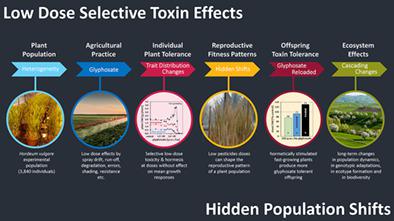当前位置:
X-MOL 学术
›
Pest Manag. Sci.
›
论文详情
Our official English website, www.x-mol.net, welcomes your
feedback! (Note: you will need to create a separate account there.)
Low glyphosate doses change reproduction and produce tolerant offspring in dense populations of Hordeum vulgare
Pest Management Science ( IF 3.8 ) Pub Date : 2021-06-20 , DOI: 10.1002/ps.6522 Regina G Belz 1 , Aki Sinkkonen 2, 3
Pest Management Science ( IF 3.8 ) Pub Date : 2021-06-20 , DOI: 10.1002/ps.6522 Regina G Belz 1 , Aki Sinkkonen 2, 3
Affiliation

|
Low toxin doses that do not affect mean responses in plant populations can still change the growth of subpopulations. Studies covering vegetative stages ascribed fast-growing plants higher thresholds for growth stimulation and inhibition, compared with the rest of the population. We hypothesized that such selective effects also play a role after reproduction; that is, the offspring of glyphosate-treated tolerant, fast-growing phenotypes is more tolerant than the offspring of untreated plants. An experimental, high-density barley population was exposed to a range of glyphosate concentrations in the greenhouse, and reproduction and final growth were analyzed for selective effects. Therefore, F0, F1 treated and F1 non-treated offspring were re-exposed to glyphosate.
中文翻译:

低草甘膦剂量会改变大麦密集种群的繁殖并产生耐受性后代
不影响植物种群平均反应的低毒素剂量仍然可以改变亚种群的生长。涵盖营养阶段的研究认为,与其他植物相比,快速生长的植物具有更高的生长刺激和抑制阈值。我们假设这种选择性效应在繁殖后也会发挥作用。也就是说,经草甘膦处理的耐受、快速生长表型的后代比未经处理的植物的后代更具耐受性。在温室中将实验性高密度大麦群体暴露于一系列草甘膦浓度下,并分析其繁殖和最终生长的选择性效应。因此,F0、F1处理和F1未处理的后代再次暴露于草甘膦。
更新日期:2021-06-20
中文翻译:

低草甘膦剂量会改变大麦密集种群的繁殖并产生耐受性后代
不影响植物种群平均反应的低毒素剂量仍然可以改变亚种群的生长。涵盖营养阶段的研究认为,与其他植物相比,快速生长的植物具有更高的生长刺激和抑制阈值。我们假设这种选择性效应在繁殖后也会发挥作用。也就是说,经草甘膦处理的耐受、快速生长表型的后代比未经处理的植物的后代更具耐受性。在温室中将实验性高密度大麦群体暴露于一系列草甘膦浓度下,并分析其繁殖和最终生长的选择性效应。因此,F0、F1处理和F1未处理的后代再次暴露于草甘膦。









































 京公网安备 11010802027423号
京公网安备 11010802027423号